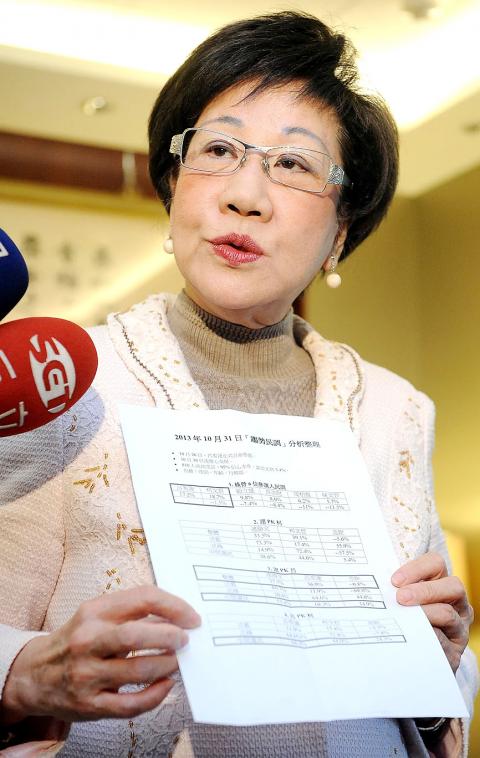Divisions within the Democratic Progressive Party (DPP) have come to the fore again, as the party prepares for the seven-in-one elections next year, with former vice president Annette Lu (呂秀蓮) warning that it could turn away public support.
Lu, who is hoping to represent the DPP in the race for Taipei mayor next year, said the Taipei primary has become a “proxy war” between party heavyweights and could result in a public backlash.
Lu did not name names, but DPP Chairman Su Tseng-chang (蘇貞昌) is widely believed to favor lawyer Wellington Koo (顧立雄), while former DPP chairperson Tsai Ing-wen (蔡英文) reportedly supports National Taiwan University Hospital physician Ko Wen-je (柯文哲), an independent who currently has the highest support rate among all pan-green aspirants.

Photo: Chu Pei-hsiung, Taipei Times
The Taipei primary has become a proxy for a private competition between Su and Tsai for the DPP chairmanship election next year, Lu said.
This maneuvering for personal gain could cost the party dearly, such as the DPP losing in all constituencies in northern and central Taiwan except Yilan County next year, she said.
Lu, who has repeatedly complained of a lack of media coverage of her campaign and the media’s focus on her age, urged DPP headquarters to remain neutral in the primaries.
Meanwhile, the emergence of the New Tide, arguably the most powerful DPP faction, has caught the public’s attention and raised tensions in the party after the group secured a series of primary victories.
Three nominees — Pan Men-an (潘孟安) of Pingtung County, Wei Ming-ku (魏明谷) of Changhua County and Lee Wen-chung (李文忠) of Nantou County — are New Tide members, while Lee Ching-yung (李進勇) won the Yunlin County primary with the backing of the New Tide.
In Greater Taichung, Tsai Chi-chang (蔡其昌), another New Tide member, is trying to narrow the gap with Lin Chia-lung (林佳龍) before the primary on Dec. 20. In Taipei, the group appears to have thrown its support behind Koo, with many city councilors who are members of the group endorsing the lawyer.
A DPP resolution in 2006 dissolved all party factions, prohibiting them from establishing offices, recruiting members and fundraising. However, the factions did not really disappear, as many continue to operate in the form of think tanks or foundations led by a senior party member.
The New Tide’s string of primary wins and heavy campaigning to assist them by Greater Tainan Mayor William Lai (賴清德) and Greater Kaohsiung Mayor Chen Chu (陳菊), both New Tide members, could escalate tensions within the party, former DPP legislator Julian Kuo (郭正亮) said yesterday.
Incumbent mayors and commissioners are advised to stay neutral in the primaries to prevent factional tensions, Kuo said.
Former premier Yu Shyi-kun’s victory in the New Taipei City primary, which drew protests of unfairness from New Taipei City (新北市) Chapter director Lo Chih-cheng (羅致政), who is close to Tsai Ing-wen, has also been described as a trade-off between Yu and Su in exchange for support of Su’s re-election campaign for the chairperson’s post next year. Yu and Su have denied the rumor.

Several Chinese Nationalist Party (KMT) officials including Chairman Eric Chu (朱立倫) are to be summoned for questioning and then transferred to prosecutors for holding an illegal assembly in Taipei last night, the Taipei Police said today. Chu and two others hosted an illegal assembly and are to be requested to explain their actions, the Taipei City Police Department's Zhongzheng (中正) First Precinct said, referring to a protest held after Huang Lu Chin-ju (黃呂錦茹), KMT Taipei's chapter director, and several other KMT staffers were questioned for alleged signature forgery in recall petitions against Democratic Progressive Party (DPP) legislators. Taipei prosecutors had filed

Taiwan would welcome the return of Honduras as a diplomatic ally if its next president decides to make such a move, Minister of Foreign Affairs Lin Chia-lung (林佳龍) said yesterday. “Of course, we would welcome Honduras if they want to restore diplomatic ties with Taiwan after their elections,” Lin said at a meeting of the legislature’s Foreign Affairs and National Defense Committee, when asked to comment on statements made by two of the three Honduran presidential candidates during the presidential campaign in the Central American country. Taiwan is paying close attention to the region as a whole in the wake of a

NEW WORLD: Taiwan is pursuing innovative approaches to international relations through economics, trade and values-based diplomacy, the foreign minister said Taiwan would implement a “three-chain strategy” that promotes democratic values in response to US tariffs, Minister of Foreign Affairs Lin Chia-lung (林佳龍) said. Taiwan would aim to create a “global democratic value chain,” seek to capitalize on its position within the first island chain and promote a “non-red supply chain,” Lin was quoted as saying in the ministry’s written report to the Legislative Yuan submitted ahead of the legislature’s Foreign Affairs and National Defense Committee meeting slated for today. The Ministry would also uphold a spirit of mutual beneficial collaboration, maintaining close communication and consultations with Washington to show that Taiwan-US cooperation

Taiwan and the US have begun trade negotiations over tariffs imposed by US President Donald Trump earlier this month, Minister of Foreign Affairs Lin Chia-lung (林佳龍) said in an interview this morning before reporting to the Legislative Yuan’s Foreign Affairs and National Defense Committee. The Taipei Economic and Cultural Representative Office (TECRO), Taiwan’s de facto embassy in the US, has already established communication channels with the US Department of State and the US Trade Representative (USTR), and is engaging in intensive consultations, he said. Points of negotiation include tariffs, non-tariff trade barriers and issues related to investment, procurement and export controls, he